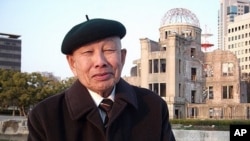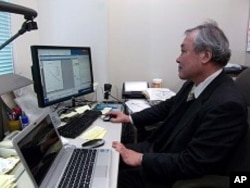Fears over the potential fallout from the crisis at the Fukushima Nuclear Power Plant have triggered painful memories in Japan of the Hiroshima and Nagasaki bombings at the end of World War II. More than any other nation, Japan is only too familiar with the horrors of nuclear radiation. But survivors of the bombings fear the legacy of 1945 is being forgotten.
Lasting reminders
Keijiro Matsushima takes a walk in the evening sunshine along the banks of the Ota River in Hiroshima - pausing to look up at the A-bomb dome that is one of the few reminders of the horrors that took place in this city.
Keijiro was a 16-year-old student at a school in Hiroshima when, on August 6, 1945, he remembers looking up and seeing two American bombers over the city.
"I just thought, ‘Beautiful planes shining in the morning sun’. But the next moment there was a very strong flash and a very strong shockwave and heat wave attacked me," he recalled.
Matsushima describes the people he saw as he made his way out of the city.
"Many of them had been so badly burned from head to feet. Their charcoal-grey skin was peeling from their faces, their arms, their necks," he said.
Lingering consequences
An estimated 45,000 people died on the day of the Hiroshima explosion. But during the following months, years and decades, the death toll continued to rise - up to an estimated 166,000.
"Even healthy people, seemingly with no injury, no burns, they looked alright - but they became ill all of a sudden with lots of strange symptoms," Matsushima said. "Like high fever, or bleeding from the gums, or many spots on their bodies. And even doctors did not know how to deal with them. People just named them ‘A-bomb diseases’, that is all.”
During the following decades, these diseases would be recognized as forms of radiation sickness.
New fears
Now the crisis at the Fukushima nuclear power plant, caused by damage from the tsunami, is unleashing a new wave of radiation over parts of Japan.
The government has evacuated everyone from a 20-kilometer radius around the plant. In Tokyo - 250 kilometers to the south - parents have been warned not to give tap water to infants, after it was found to contain high levels of a radioactive element.
The survivors of Hiroshima and Nagasaki - the so-called ‘hibakusha’ - have become the major source of information on the effects of radiation exposure.
Professor Masaharu Hoshi of Hiroshima University has spent three decades studying them. He says his biggest fear now is a sudden surge in radiation levels from the Fukushima plant.
He says with Fukushima, one scenario is that people are exposed to radiation gradually over a long time. That is not a problem. But if later there is a nuclear explosion and people get exposed over the course of couple of days, that scenario really scares me.
Hoshi says he fears information is being hidden from the public about how serious the situation is.
For example, he says, the government says everyone living beyond a radius of 30 kilometers from the plant is OK staying at home. But there are still dangerous areas outside that 30-kilometer zone. He says he believes an 80-kilometer zone, as suggested by the American government, is the far better calculation.
Lessons learned?
Keijiro Matsushima says Japanese people soon forgot the horrors of the atomic bomb after 1945.
“People thought so long as nuclear power is used in peaceful ways, that is OK. But we should have learned the evil of nuclear power from the experiences of Hiroshima and Nagasakim,” he said.
But, says Matsushima, the threat from Fukushima nuclear plant has reminded Japan of what happened back then - and the whole nation fears what may happen next.
“From now on we will have a very hard time. I am afraid so. But we have to do our best to recover and rise up again. Yes we can!” Matsushima said.
It is in that spirit that the firefighters and engineers battling to prevent disaster at Fukushima have been embraced as heroes.
Japan knows only too well the potential consequences if they fail.





